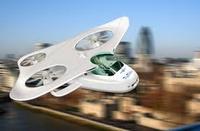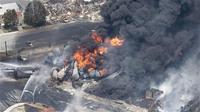-
Surge in shipment of oil by rail comes at a high cost: deadly accidents, derailments, and oil-spills
In 2008 American railroads carried 9,500 cars of crude oil. By year end 2013, that number reached 415,000 cars loads. America’s energy boom, made possible by hydraulic fracturing, or fracking, and the surge in oil output in North Dakota’s Bakken region, have made crude by rail tremendously profitable for the nation’s top railroad companies. The surge in crude by rail has come at a high cost: a growing number of deadly accidents, derailments, and oil-spills. Experts say that these accidents demonstrate the limited ability of government and railroads to manage the hidden risks of a sudden shift in energy production. “It may not happen today or tomorrow, but one day a town or a city is going to get wiped out,” says one expert.
-
-
Building better butt bombs: Al Qaeda’s instructions to followers
Five years after using a “bum bomb” for the first time – on 28 August 2009, against the Saudi deputy interior minister – al Qaeda bomb makers are at it again. Having actively searched for new and better ways to take advantage of privacy (“don’t touch my junk”) considerations which govern airport security checks, one of the organization’s bomb makers goes public. The latest issue of Inspire, the organization’s English-language magazine, contains a detailed 22-page article on how to construct a butt bomb and conceal it in one’s anal cavity. The article alsoadvises would-be suicide bombers on where to sit on the airplane to ensure the most destruction, and also recommends using the hidden bomb for assassination attempts.
-
-
The science of airport bomb detection: chromatography
As the holidays draw near, many of us will hop on a plane to visit friends and family — or just get away from it all. Some will be subjected to a swab at the airport to test clothes and baggage for explosives. So how does this process work? The answer is chromatography — a branch of separation chemistry — along with mass spectrometry. Although instrumental chromatography is a mature technology (the first instruments were produced just after WWII), new applications frequently pop up. Some are a matter of scale. Pharmaceutical companies that produce monoclonal antibodies (often used in cancer treatments) make use of capture chromatography to purify their products. On an industrial scale these can be tens of centimeters in diameter and meters in length (typical lab scale systems are a few millimeters diameter and 5-30cm long). Other uses can either be in a specific new application, such as detecting cocaine on bank notes using the gas chromatography systems often seen at airports as bomb and drug detectors.
-
-
Helicopter steering innovation could herald new era for aerial transport

For decades, flying cars have featured in our visions of what futuristic cities might look like. Now EU-funded researchers with the MYCOPTER project have developed a steering system that makes helicopters as easy to control as cars. While having your own personal aerial vehicle (PAV) may still be some way off, the success of the project opens up the possibility that one day flying vehicles could indeed be an integral part of the urban transportation network.
-
-
FAA caught between commercial pressures, safety concerns in regulating drone use
Law enforcement agencies in major U.S. cities have expressed concerns about the possible use of drones by terrorists to launch bombs against key U.S. targets, including shopping malls, stadiums, and even banks. The FAA is in a tough spot, says one expert.”If they come out with rules that are not protective enough and then there’s some sort of an accident then they will be criticized for not having been more careful with this technology,” he says. “On the other hand, if they come out with rules that are viewed as overly restrictive in the name of safety then they are going to be criticized as impeding the growth of the industry, so it’s a very difficult balancing act that they have to navigate.”
-
-
Smaller lidars could be mounted on UAVs for underwater scans

Bathymetric lidars — devices which employ powerful lasers to scan beneath the water’s surface — are used today primarily to map coastal waters. At nearly 600 pounds, the systems are large and heavy, and they require costly, piloted aircraft to carry them. Georgia Tech Research Institute (GTRI) researchers have designed a new approach that could lead to bathymetric lidars that are much smaller and more efficient than the current full-size systems. The new technology would let modest-sized unmanned aerial vehicles (UAVs) carry bathymetric lidars, lowering costs substantially. These advanced capabilities could support a range of military uses such as anti-mine and anti-submarine intelligence and nautical charting, as well as civilian mapping tasks. In addition, the new lidar could probe forested areas to detect objects under thick canopies.
-
-
Mobile radio passive radar helps protect ports, coastal communities
Airports are subject to careful security surveillance, but many coastal towns and ports are not; they often lack radar installations to keep track of small boats, meaning that terrorists could easily use speedboats to approach the coastline and bring explosives on land. Now, researchers have developed a passive surveillance system for littoral regions based on mobile radio illumination called Passive Coherent Location (PCL). It passively employs the continuous radio signals emitted by cell towers to detect suspicious boats, including those speedboats favored by pirates for approaching cargo ships. The fusion with electro-optical or infrared systems allows the classification of the different targets.
-
-
Cockpit automation causes pilots to lose critical thinking skills

In the wake of recent airline crashes, major news networks have aired concerns about pilots’ ability to accurately fly “by hand” when the airplane’s cockpit automation systems fail. Although many of these concerns have centered on manual skills such as operating the airplane’s controls, new human factors/ergonomics research suggests that pilots’ thinking skills, such as navigating, remaining aware of the status of the flight, and diagnosing troublesome situations, are most vulnerable in today’s automated cockpits.
-
-
New terahertz device could strengthen security
We are all familiar with the hassles that accompany air travel. We shuffle through long lines, remove our shoes, and carry liquids in regulation-sized tubes. Even after all the effort, we still wonder whether these procedures are making us any safer. Now a new type of security detection that uses terahertz radiation is looking to prove its promise. Able to detect explosives, chemical agents, and dangerous biological substances from safe distances, devices using terahertz waves could make public spaces more secure than ever.
-
-
U.S. strike kills Khorasan Group’s chief bomb-maker
U.S. airstrikes in Syria overnight successfully hit a group of al-Qaeda-affiliated militants, killing the group’s top bomb-maker. David Drugeon, a French Islamist militant, was killed along with other Khorasan Group members near Saramada, a town eighteen miles northeast of Idlib in Syria’s northwest. Drugeon escaped an earlier U.S. airstrike, on 22 September, which was aimed to take him out. The innovative Drudgeon was designing bombs made out of clothing dipped in explosive solution and explosives concealed in personal electronics. In July, the Transportation Security Administration (TSA) banned cell phones without electronic charge from airplane cabins in response to the intelligence coming in about Drudgeon’s designs, much of it fragmentary.
-
-
Designing the air traffic control systems of tomorrow
On a good day, flying can be a comfortable and efficient way to travel. All too often, however, eather or overcbooking can cause delays that ripple through the system, inducing missed flights, anxiety, discomfort and lots of lost time and money. Things had gotten so out of whack that in 2003, Congress enacted a law designed to bring online a Next Generation — or NextGen — air traffic control system by January 2020. The Department of Transportation would require the majority of aircraft operating within U.S. airspace to be equipped with new technology to track and coordinate aircraft and would institute many other programs to improve air travel.
-
-
Petroleum industry, railroads want deadline extension for phasing out old tank cars

Transportation of crude oil by train jumped to 408,000 in 2013, from 11,000 in 2009, partly due to the rise in production from North Dakota’s Bakken region, where oil production has surpassed pipeline capacity. The increasing use of rail to transport crude oil has resulted in several accidents. The Department of Transportation want to phase out older tank cars — because they have thinner shells and are thus more vulnerable to accidents when transporting flammable liquids like crude oil – and replace them with new, safer tank cars with thicker shells. The petroleum industry and U.S. railroads want DOT to extend the deadline for phasing out old tankers from two years to four years.
-
-
Better regional coordination for port security
In the days following the 9/11 terrorist attacks, first responders in the Northeast were suddenly responsible for monitoring potential targets, including a military base, nuclear power plants, and a deep water port. Emergency teams soon found out that they were ill-equipped to coordinate with one another. That realization prompted better organization among regional first responders.
-
-
Japan to adopt automated airport gates equipped with facial recognition technology
More than eleven million people visited Japan last year, the highest on record, and the government is anticipating close to twenty million foreigners in 2020, the year Tokyo will host the Summer Olympics and Paralympics. Japan plans to adopt automated airport immigration gates supported by facial recognition technology, because while the number of foreign visitors continues to increase, the number of immigration officers remains limited, or even shrinks. A general concern with using facial recognition technology at immigration gates is that passports can be valid for a decade, while a person’s appearance may change within that timeframe. Another concern with the proposed system is how facial data image collected will be stored or erased.
-
-
U.S. tightens scrutiny of U.S.-bound airline passengers

Roughly 1,000 of the 4,000 fighters who traveled to Syria and Iraq to join ISIS carry passports of one of the thirty-eight Visa Waiver Program countries – countries whose citizens do not need a visa to enter the United States. U.S. officials are now reviewing methods used to screen airline passengers with passports from Visa Waiver countries before they board U.S.-bound flights.
-
- All
- Regional
- Water
- Biometrics
- Borders/Immig
- Business
- Cybersecurity
- Detection
- Disasters
- Government
- Infrastructure
- International
- Public health
- Public Safety
- Communication interoperabillity
- Emergency services
- Emergency medical services
- Fire
- First response
- IEDs
- Law Enforcement
- Law Enforcement Technology
- Military technology
- Nonlethal weapons
- Nuclear weapons
- Personal protection equipment
- Police
- Notification /alert systems
- Situational awareness
- Weapons systems
- Sci-Tech
- Sector Reports
- Surveillance
- Transportation
Advertising & Marketing: advertise@newswirepubs.com
Editorial: editor@newswirepubs.com
General: info@newswirepubs.com
2010-2011 © News Wire Publications, LLC News Wire Publications, LLC
220 Old Country Road | Suite 200 | Mineola | New York | 11501
Permissions and Policies
Editorial: editor@newswirepubs.com
General: info@newswirepubs.com
2010-2011 © News Wire Publications, LLC News Wire Publications, LLC
220 Old Country Road | Suite 200 | Mineola | New York | 11501
Permissions and Policies
